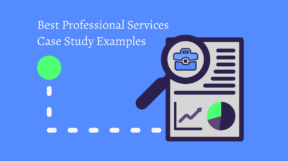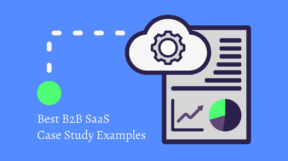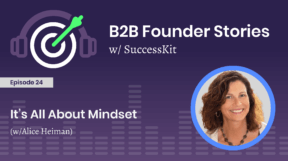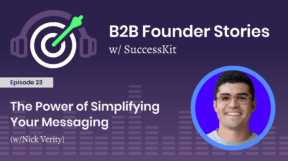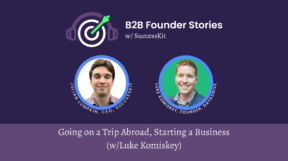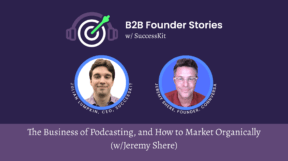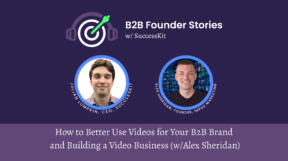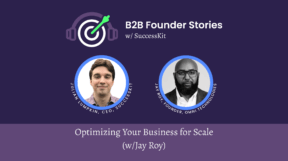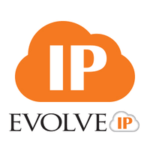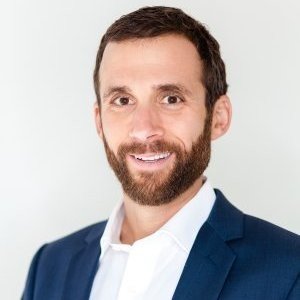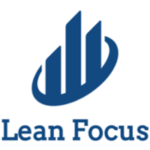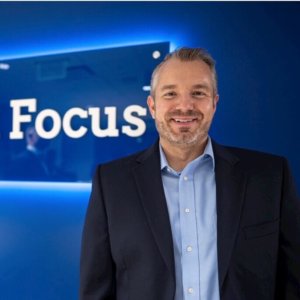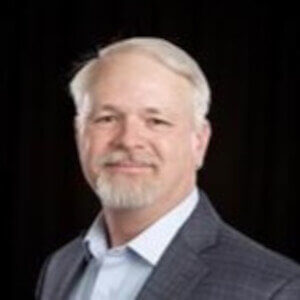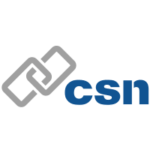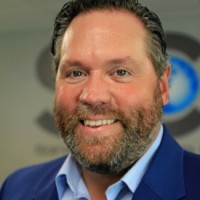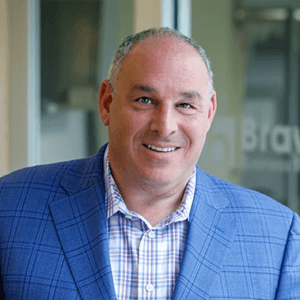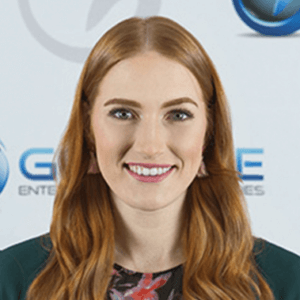Listen to this episode now on Spotify or Apple!
In this episode of our B2B Founders Stories podcast, Jay Roy, the founder and CEO of OMNI Technologies, describes how he started his company and the direction OMNI and his overall career have taken over time and reflects on how military experience propels veterans to start their own businesses. He also shares his views on how AI will vastly impact every market and sector and how small to mid-sized companies can start integrating AI into their business strategies.
“Something that I learned about myself through the military was I loved working. We have the ability to find a purpose and intent for something in the military. We call it a ‘mission,’ no matter how large or how small. That mission is defining the subject matter experts that you want to work with to go and attack that mission and then coming out on the other end. So the planning and the execution and all of the stuff that happens in the middle—what we call the sauce—is making as a part of that as well. So I love to be in the mix of all of those different things.”
Jay Roy, Founder and CEO of OMNI Technologies
Transcript of Podcast Episode 19: Optimizing Your Business for Scale (w/Jay Roy, Founder and CEO of OMNI Technologies)
Julian Lumpkin: Welcome back to another episode of B2B Founder Stories with SuccessKit. As a quick reminder, if you need help with Case Studies or Video Testimonials, visit us at SuccessKit.io. In this episode, I interview Jay Roy. He is the founder and CEO of OMNI Technologies. We talk about what led him to become an entrepreneur, his changing goals for his business from when he started it to now building a scalable company of 100 employees, and we go deep into how AI technologies like ChatGPT are going to take over and affect the technology world. I hope you enjoy this episode. All right, Jay, thank you so much for joining.
Jay Roy: No problem, Julian. Good to see you, talk to you again.
Julian Lumpkin: So to kick us off, tell us very briefly about OMNI Technologies.
Jay Roy: So OMNI Technologies is an IT engineering services firm. We focus on a lot of core competencies in relation to system engineering, software development, DevSec, ops, cybersecurity. We focus more on the defensive and compliance side than we do the offensive. Although we have the ability to stretch there as well. Digital transformation, cloud computing, all of the marketing buzzwords that you hear a lot of the big companies using. we’re one of the small companies that actually knows how to execute those things efficiently as a part of it.
Julian Lumpkin: And what type of organizations do you typically serve?
Jay Roy: Primarily government contracting. It represents over 50% of our business at this point, but we have a commercial on within the firm as well. We do a lot of things in relation to pretty much the same core competencies but just for industry in a multitude of different sectors which we really enjoy as well, because it gives us an opportunity to stretch. So we focus with support companies that are doing healthcare-related technological innovation automobile industries, believe it or not. we do a lot with other smaller firms but what we like to call mom-and-pop shops that are focusing on either developing new technology so they’re doing an attribute of innovation within their marketing sector. And we help them really just have an understanding of how technology can be applied to the different use cases because they may not have the workforce and things of that nature as well.
Julian Lumpkin: And can you give us a very quick overview of the structure, kind of the size of the business, how many employees, how long in business, and the general structure?
Jay Roy: Yeah, we were just under 100 at this point. We’ve been in business for nine years. From a general concept perspective, I really started this firm out as a lifestyle company in that regard, and it’s grown over the years, primarily organically. We just recently, I would say in the last couple of years have really started to branch out and do a little bit more in relation to business development and marketing to grow the size of the company. Not just the revenue, but wanting to do more in relation to the opportunities that we’re able to provide to our current employees, but also our future employees as well.
Julian Lumpkin: Great. And we’ll kind of come back to your goals starting the company and how it’s gone, but I want to start at the very beginning. what did you want to do for your career when you were growing up? What did you think you were going to be doing?
Jay Roy: This is an interesting conversation I’ve actually been having recently with several different people. Primarily I’m a mentor through a couple of different organizations, but also several different individuals. And I tell them my life’s passion growing up was actually to be more of an architect. So still in the attribute of engineering, because I’m still in that realm, but more focused on architectural design and industrial design and things of that nature as well. But I really sucked at math. So this was before the utilization of all of the programs that we have today that can do all of that for the engineers that exist today. So if I had to go back and do it again, I would really study hard and math so I could actually get that passion attribute done before I dove into information technology.
Julian Lumpkin: Can you pinpoint around when you realized that you wanted to be an entrepreneur or at least kind of work for yourself as opposed to bigger companies?
Jay Roy: Yeah, actually I can, I had a friend that reminded me several years ago about the idea of being an entrepreneur. We were having, I guess what at that point in time was a casual conversation, and I guess I was griping to him about what I was doing for the current employer that I was working for. And I mentioned to him, I’m not going to be doing this for much longer. I’m going to be working, I’m starting my own firm. I got these things I need to learn. Just started talking about, even before I knew it, some of the tenements of attributes of knowledge that I needed to obtain, that I thought I needed to obtain at the time in order to try to be a successful entrepreneur. What I didn’t realize was I was actually speaking to my future, and I had no active plans at that point. I just was speaking and then that turned into me actually actuating all of those things and being where we are today.
Julian Lumpkin: So what were you doing before you started OMNI Technologies?
Jay Roy: A couple of different things. Right before starting OMNI Technologies, I had the honor of being an executive and partner to a couple of different firms before this. Ao as an attribute of working with the collective of people and helping with the business opportunity of creating something either from scratch or a firm that already existed and helping them grow. I sort of worked through this industry, through a multitude of those different vectors as a part of that. And then before that, I’m actually a military veteran. So I was in the military before I came out of the military and started becoming a government contractor.
Julian Lumpkin: Got it. And it may be a little bit of both, but were you driven to entrepreneurship by kind of working for these big organizations and not liking the kind of formality and the power structures and everything about the way they worked and felt like you had to get out of it? Or was it more like you had to go create something?
Jay Roy: A little bit of both, to be honest with you, or a lot of bit of both to be perfectly honest with you. something that I learned about myself through the military was I loved working. I still do love working in what I call smaller attack squads. We have the ability to find a purpose and intent for something in the military. We call it a mission, no matter how large or how small that mission is defining the subject matter experts that you want to work with to go and attack that mission and then coming out on the other end. Right. So the planning and the execution and all of the stuff that happens in the middle, what we call the sauce is making as a part of that as well. So I love to be in the mix of all of those different things as an aspect of it and what I found in being with big businesses because coming out of the first of all, the military is a big business. One of the biggest businesses we have in this world especially for the United States. but what I found in working with big business is that to obtain an attribute of success, you have to deal with an attribute of politics. And I am not a politician. I hate that part of it. I am a nerd and an engineer by nature. I’m also an artist by nature. So I really hate the attribute of having to deal with politics when it’s impacting my ability to create what I consider my art as an engineer. Right.
Julian Lumpkin: My previous guest, Collin, was also a military veteran, and he described the military as the largest organization in the world. And it’s interesting and probably not surprising to you that so many veterans go on to start their own business. What do you think it is about working in the military, which in some ways, because, like we said, it’s such a big organization, it’s so different from being an entrepreneur. What do you think it is that kind of drives veterans to want to work for themselves?
Jay Roy: Well, depending upon the type of individual you are before going into the military, really has the military has the ability to bring out of you the best of you, and also the worst. But in the attributes of bringing out the best, if you have these qualities as an individual for leadership and things of that nature what you recognize is that you want to spread, that you want to continue to execute. I think you learn in the military very quickly whether or not you are naturally a follower or if you’re naturally a leader, and you just need opportunity to execute that leadership. And so I think for many prior military personnel when they get out of the military, they are looking for an opportunity to execute that attribute of leadership. Sometimes that comes through the attribute of working with other firms, and you have leadership roles. And then sometimes it’s just truly you need to be an entrepreneur in order to get all of what you’re feeling inside those butterflies, those things that drive you crazy about how other people are doing it, or what you’re seeing and experiencing and how you think you can do better. Right. the military teaches us aptitudes of optimization and innovation, et cetera. And so you want to explore all of that as much as you possibly can.
Julian Lumpkin: Are there any kind of habits or kind of approaches that you learned in the military and worked well in the military that you feel like you had to change or get rid of because they didn’t apply well to the business world?
Jay Roy: Good question. Nobody’s ever asked me that. Not in that way that I can recall. Get rid of one in particular that I think I’m still evolving to, still very much learning is the aspect of in the military, there is a ranking system, and you follow based upon that ranking system. In business, there is also a ranking system, but the attribute of consequence for not following is entirely different. Right. In the military, I tell this to my family, my kids, my wife sometimes, and she just looks at me strange. But I tell this to a lot of people, and it’s like the consequence in the military is the potential of death. Like, people could die if you don’t follow orders. And outside of I would say, maybe being a parent, there is no greater consequence. That no other job that I know of where you would kind of feel that outside of having someone’s life in your hands, maybe doctors. I’m not a doctor, so I can’t equate that, but I would imagine right, in that regard. So the thing that I am learning that I have to let go of is feeling as if the consequences are always dire to that extent. Because that’s not always the case. Right. it may be an inconvenience, but that doesn’t mean that it is dire in that regard. So it’s the equation of how I’m applying what I have learned in that regard, and I’m still working through that.
Julian Lumpkin: Interesting. So let’s go back to when you were starting OMNI Technologies. Was it a really difficult decision to start the company, or was once you kind of had the idea, was it a no-brainer, very difficult decision?
Jay Roy: As I said earlier, prior to I was working with and for others as a partner, as an executive within some firms. And so going out on my own, although I knew I had, I guess I felt I had the ability, it was still the attribute of the unknown of doing it on your own and relying on just yourself. Which made me pause at times because as much as I knew that I didn’t know enough, as much as I did know I knew that there was a whole world waiting for me on the other side of things I had not been exposed to, things I had not learned yet. New things that were going to be happening to me, through me, by attribute of me and then the aspect of others. So it was a nerve-wracking time frame in that process to decide to do it, to pull the trigger and say yes, because it’s very easy to get an EIN and start a business on paper. But the execution of doing it and then functionally waking up in the morning and recognizing, oh, crap, it is on me and only me, and I have no one else to rely on. And now I have to take everything that I have consumed and learned and figure out how to apply it in this way by myself to some degree. Right. it’s a new sensation that I think many entrepreneurs kind of go through. and still, as you continue to evolve, I think your business, whether it’s your model that’s changing, or the implementation of certain attributes of your business that changes over time, you still have to apply that same those butterflies still come up as you’re working through those things, for sure.
Julian Lumpkin: What were your goals when you started the company?
Jay Roy: At that part of my life, honestly, make enough payroll for myself. It was really simple. Right. I had a family at the time. I had a family of three, four, I can’t remember. I think it was just a family of three at that time. No, I take it back. It was a family of four. I had a family of four. Right. So it was how do I make enough money to make sure that what I’ve been earning thus far? I can hopefully equate to that, so that our lifestyle did not change so drastically. So that was number one. Right. And then number two was beyond the finances was the attribute of benefits, just making sure that I have the health care and all this other stuff, because as an entrepreneur, that part of it was entirely new to me. Right. in the firms that I worked with prior even as a partner, that just wasn’t a part of the operations that I handled directly. So, although I knew what the output was, I didn’t know how we got to that moment. Right. So understanding the nuances of all of the attribute of operations from health care and benefits and all that other stuff, and taxes, even to some equation, just wasn’t something I necessarily handled on my own. So it was a learning curve from many respects in that regard.
Julian Lumpkin: When you started it, did you have a vision for being somewhere like where you are now with, I think you said, like, 100 employees? Was that always kind of the long-term goal, or did that just sort of happen without necessarily you aiming towards it?
Jay Roy: No, that evolved without me aiming towards it. One of the firms that I worked with prior to starting OMNI, I helped the business grow to nearly 300 people. The business was sold for a gobs on the money which was a good thing. Right. Because that was the attribute of building a for-profit business. Right. So the maturation of the business maturing into an asset and then being able to record a financial gain for that asset. Great. That happened. but after dealing with so many nuances and variances, I really just wanted to be an employee of one. so my initial goal was to just come out and be a consultant and consult for different firms, organizations, use my expertise. because what I recognized from going back to the financial piece is that I could make just as much money just doing it as an employee of one, rather than building it to an X size business virtues of scale. Even though the asset overall may not be worth more in the long run, I would obtain the financial reward that I could based upon just my own. So the attribute of organic growth, I had a lot of customers that prior and new customers that got to me by word of mouth or association through relationships that reached out and said, hey, we heard about what you’ve done, and we want you to help us, et cetera, et cetera.
Julian Lumpkin: Interesting. And moving to kind of when you obviously made it on your own and starting to grow, let’s say, from going from two to ten employees, what was the biggest challenge or what part of that process was harder than you expected?
Jay Roy: The biggest challenge, I think, initially, was just figuring out how we do the same thing over at scale. Right. The rents and repeat the rents and repeat, but then doing it at a greater scale. because when you’re starting a business, unless you have, in my opinion, done this before, or you are paying for a service that is providing all of those attributes for you of business operations, you’re figuring a lot of things out. And sometimes that stuff can be spelled out for you through consultancy. You can go to higher service, other individuals, or platforms that teach you a lot of things or do a lot of things for you. but when I started this firm, a lot of those things did not exist in the way that they do in the market today. so it was really about figuring out how we scale our operations from two to ten, but also the back office operations of doing the same thing over and over again, but being more efficient as well as we go along in doing that. So the nuances and as the company was growing, not only was I hiring new people, but also hiring new people in different states. So there’s the attributes of learning about different tax codes in different states. So there’s all these different things that you learn about the federal attributes, the state related attributes, the localized attributes, and then depending upon the market in the sector that you may be in localized certifications and things like that. So there’s a bunch of new things that I had to learn in regards to functionally operate the business the way it should be operated and the.
Julian Lumpkin: Structure of your business. Now, do you have an executive team? What does the structure of the business look like right now?
Jay Roy: I’ve been blessed to have a very good executive team. I have a chief of operations that handles a lot of the day-to-day within a multitude of the veins of finance and business operations, HR-related activities and things of that specific nature. got a chief technology officer that focuses on the attributes of tech within the company and how we use technology outside for our customers and things of that nature. I’ve got a solutions officer that focuses on literally just creating whiz-bang things, right? Research and development type of attributes of how we use technology and things of that nature, building business processes for ourselves and our customers as a part of that. And then I recently hired someone to do business development, right? So a big attribute of not just growing the business, but also in understanding that the market is constantly shifting, sustaining the business is business development. And so for a long time, I was on my own in doing a lot of the marketing and the business development for the company. Now I’ve hired someone that’s been able to come in and take my vision and apply it to their knowledge and skill set and understanding of having many more years than I in doing business development in the market sector and moving forward.
Julian Lumpkin: And what do you spend your time on now? What’s your day-to-day like?
Jay Roy: It’s been interesting, so I’ve had the opportunity to focus less on making the sausage and figuring out how the sauce is to be made, to use that corny analogy. But I have the opportunity, what I call level up or bubble up in regards to focusing on divisionary attributes. how do we optimize some of our business operations? What technologies and platforms can we introduce to different things that we’re doing? where does automation fit in? Where does it make sense? What tech should we be using for an attribute of automation? And things of that specific nature. Customer relationships, really focusing on whereas before starting out the business, of course, I was 100% billable while still managing 30 employees as an example. And now I have the opportunity to really focus on just the relationship that we have with our customers and building that, understanding their use, cases, their requirements, how my team is actively doing on projects that we’re working on, but also the future of that organization. What does that customer need? What are they envisioning for themselves? And how do my team and I help them shape that and then execute that as a part of that as well. and then a big part of owning any business taxes, right? The financial attributes of dealing with understanding the basis of how the tax codes are changing and the finances and the cash flow attributes, and all of those pieces as well. And along with that comes the conversations that I love dearly. Not really legal. Talking to legal about every nuance there is of just operating the business as well.
Julian Lumpkin: I’m curious about your long-term vision for the company. Where do you see OMNI Technologies and let’s say five to seven years from now.
Jay Roy: It’s interesting. I’m going through another growth right now internally, just in relation to how that applies externally to what I want to do with the business. But the introduction of some of the newer technologies in relation to digital transformation, automation, robotics, artificial intelligence, large language models. I am an engineer and a nerd at heart. Even before I knew that was a thing, now I can look back and say, yeah, I was doing these quirky things as a kid, tearing radios apart and putting them back together type of stuff. so the introduction I say introduction because I believe we’re in the first thirds of these kind of things in relation to what they may mean in the long term of how they be utilized. But the introduction of these things really have revved up my juices in regards to how I see my company having the ability to apply our core competencies to the use cases that they can apply to as a part of that. And so we’re doing a bunch of different things with different customers right now and helping them understand how to use large language models, artificial intelligence attributes of automation and digital transformation as a part of it. So it’s all been really cool. so what my interests are in relation to how that translates to the business is I’m m hoping to be around for some years now and just doing it well, just getting better at it. I tell people all the time. One of the reasons why I named the company OMNI. OMNI stands for all right, so as technology has evolved over the nine years that this company has been around, there has been a lot that has stayed the same, but there’s been a whole bunch that has changed. And we’ve been able to apply our core principles of what we do with engineering to all of those different attributes of technology as a part of that. So I think as the tech continues to evolve, so will we, and we’ll continue to figure out how we help our customers evolve with that as well.
Julian Lumpkin: My last question is about AI. And you guys are obviously a kind of cutting-edge technology company. So of course you’re going to be thinking about that a lot and it’s going to affect what you do. But kind of for the more average regular business, do you think all everyone’s talking about is AI? Do you think it’s being overblown a little bit or is it really going to be massively impacting all businesses or a vast majority of businesses in the next few years? Like, you hear some people saying it’s.
Jay Roy: Going to vastly impact. There is an application for artificial intelligence in, I think, every market and sector. And the adoption, in my opinion, is definitely going to impact every market and sector. But the thing that we care about and probably keeps us up at night is what does that mean for our labor pool? Right? So how does that impact our people? So I think much like any industrial revolution that our world has gone through through the attribute of humanity, we are going to figure out how to adopt to this, and our labor pool is going to figure it out. They’re going to change as an aspect of that as well. Businesses if they aren’t already figuring out how to use this technology, artificial intelligence, AGI, large language models, they need to be tapping into it because it is a wave that is not going to be going away. I was talking to my CTO maybe a week or two ago, and I likened it to some degree, a small degree, but to some degree of what we saw with happening with cloud computing in the attribute of an aspect of innovation, digital transformation. People didn’t know. They knew the buzzword, but they didn’t know exactly. And still some don’t know exactly what it means in regards to how you use it, how it adopts, and how it can help you. but it’s the attribute of optimization, efficiency, building into some core attributes of what we do with tech. And I see this as a much larger scale application in that regard as well. So I am very interested in my company many of my team members. We are in the forefront. We’re having conversations actively with our customers and helping them to understand what this means, what the tech means, how the tech can be applied to their requirements, their use cases as a part of that. And we are also using it internally from an operations perspective. We’re tying it into a multitude of different things that we do either from content generation and or analysis of ideas and ideation as we continue to evolve things as a part of that as well.
Julian Lumpkin: Yeah, the cloud computing analogy is interesting. The biggest difference, of course, one of the important differences you pointed out is that this affects the labor market. So it’s not just the way this could really change the way that the world operates in a different way, I guess. I do want to ask one more question. What advice would you give to a small to medium-sized company owner that’s not necessarily a technology company about how to start thinking about integrating AI into their business strategy?
Jay Roy: I think that’s the thing. I don’t know a company that isn’t tech, right. This is the truth.
Julian Lumpkin: Maybe I should rephrase that to say, not a highly technical company. Someone who’s not spending their time outside of work thinking about this stuff and on the forefront of it. Yeah, someone who they’re just hearing about it and trying to figure it all out.
Jay Roy: Well, here’s a conversation I had recently, right. I’ve got some friends that are lawyers, right? They’re in the legal profession as a part of it. They don’t consider themselves technical per se, but they absolutely use technology every single day in a multitude of different veins. And so we were talking about some of the challenges that we already foresee. This was even before the letter came out with Elon Musk and several others kind of saying we need to stop. We were having this conversation about the application of the technology and what it could mean for their specific profession. And I started talking to them about just some use cases, and I was like, your briefs that you prepared, how much time does that take? And they gave me their average answer, and I’m like, imagine having something that could help you summarize a lot of what you’re doing in a fraction of second. And now your optimization goes from being. Literally several days, which equates several hours that equates over several days for many of these briefs into just 15 minutes. Imagine that I was like, imagine how much more efficient you could be. Because your job is not to use the tech to create the content. So you don’t have to do anything. It is to help you supplement your thought processes in the creation of the content. You are still responsible for the outputs, right? So it’s still your knowledge base that’s getting intertwined, but you don’t have to sit there and type all of it now. And you don’t have to generate the idea when all you have to do is create the prompt that then pushes the AI to give you the content that you need. And whether it’s a 50% answer, 95% answer, whatever it is, you’re way closer than you would have been, faster than just not using the tech in and of itself. So, some interesting dynamics, I would say, for those that are in the markets and sectors where they think it doesn’t apply. If you look at your use cases and where you can optimize, I’m pretty sure you’re going to find where you can use this technology. and there are likely already platforms that exist that in some capacity you could be testing out and figuring out if it makes sense for you.
Julian Lumpkin: Great. Well, to close out here, tell our audience where they can find OMNI Technologies’ website and where they might be able to find you on LinkedIn or any other social media you want to tell us about.
Jay Roy: Yeah absolutely. So the easiest way to get in touch with us is through our website teamomni.com, as well as social media—TeamOMNITech on pretty much every platform. And if you’re looking for me and us on LinkedIn, it’s OMNITechnologies, LLC, and I’m under the moniker of Jay Roy.
Julian Lumpkin: J-A-Y-R-O-Y all right, Jay, thanks so much for your time. This is great.
Jay Roy: Thank you so much. Julie, good talking to you.
Julian Lumpkin: Thanks for listening. Hope you enjoyed the episode. If you want to hear more founders, share their stories, their expertise, and learn about how they got where they are. We have several episodes in the archive where you can follow us to hear new episodes every month on our channel.
Conclusion
Subscribe to the B2B Founder Stories podcast on Spotify and Apple and never miss an episode!
If you have an idea for a future topic you’d like addressed or if you’d like to be a guest on the series, contact Julian via the form on our Learn More page.
![Featured image for the article titled "Optimizing Your Business for Scale (w/Jay Roy) [PODCAST]"](https://successkit.io/wp-content/uploads/2023/06/successkit-podcast-episode-19-jay-roy-01-768x464.png)



